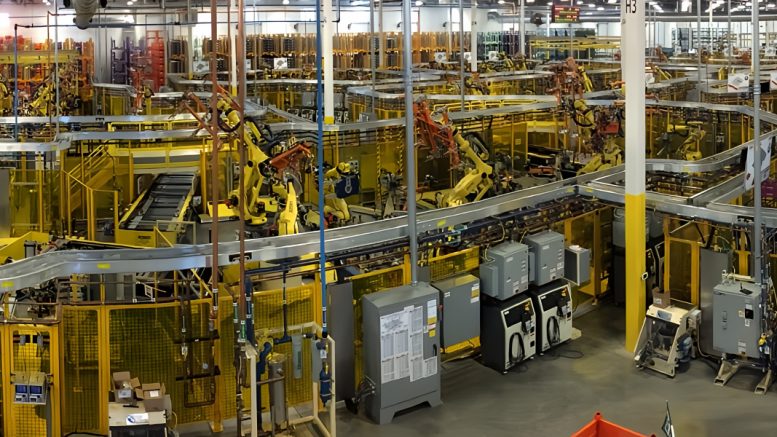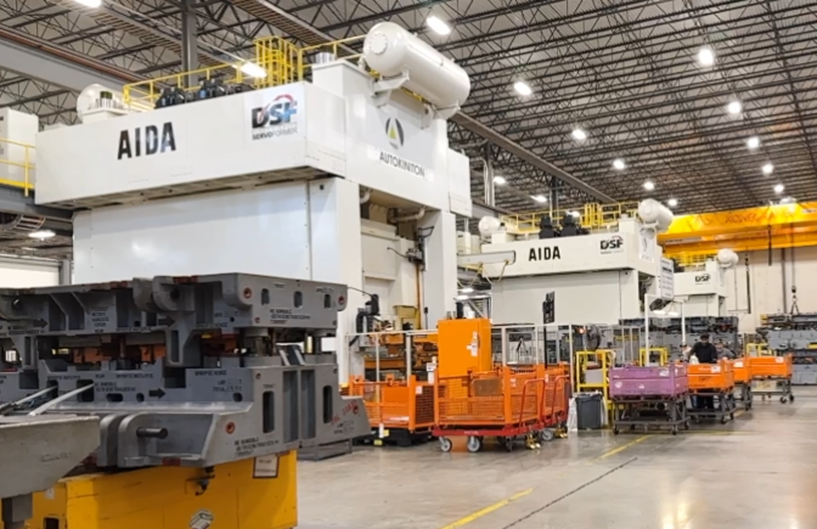The OpExChange peer networking group consistently gravitates towards plant visits that showcase the efficient application of advanced technology. Members are always eager to witness the potential that arises from the integration of sophisticated technology with the innovative insights of engaged associates. They particularly value observing companies that not only achieve a high level of excellence but also demonstrate a relentless drive for continuous improvement. Such companies are constantly seeking ways to enhance productivity, provide exceptional customer experiences, and contribute to the well-being of their employees and the South Carolina manufacturing ecosystem. Our recent plant visit to Autokiniton in Fountain Inn provided a firsthand glimpse of each of these qualities in action.
A member of the OpExChange for nearly four years, Autokiniton has exemplified operational excellence since its inception in 2015. This cutting-edge manufacturing facility features some of the world’s most advanced automated production technologies, specifically designed to supply floor pans to the BMW plant in Spartanburg.
From all OpExChange plant visits to date, this is the first visit where the number of robots actually was greater than the number of associates working in the plant.
In this three-hour event, Autokiniton not only shared how they are using technology to expediently provide floor pans to BMW, but also to do this in a safe, environmentally friendly way. They also shared how they found a way to further improve upon their processes by using another form of robotic technology.
High-Capacity Stamping
The start of their operation begins in the automated stamping operation. Three massive AIDA servo presses are producing stamped parts in a continuous, coil-fed operation. Coils of steel, weighing about 40,000 pounds each, are automatically fed into the presses. Each of these presses has a capacity of 2,200 tons.
Scrap metal collection and recycling are streamlined and virtually undetectable. Concealed conveyors beneath the presses deftly capture and transport all scrap metal, accumulating it in trailers positioned outside the building. Upon reaching the trailer’s weight capacity, a sensor triggers an alert, notifying the scrap vendor to dispatch a truck for collection – eliminating the need for human intervention.
Approximately half of the metal stampings produced at this facility utilize in-die fasteners. This intricate technique poses a significant challenge in the metal stamping industry. The process entails embedding fasteners, such as screws, nuts, and rivets, directly into the stamped component during the stamping operation, rather than performing this task as a separate, offline step. Achieving precise positioning and mating surface tolerances demands a highly dependable and repeatable process. The Greenville facility has developed a reputation within Autokiniton for its mastery of this specialized technique.
Recognizing the criticality of machine uptime, the facility has an extensive tool and die shop. This in-house workshop is fully equipped to handle all die maintenance and engineering changes, ensuring the smooth and uninterrupted operation of production machinery. This not only minimizes downtime and maximizes productivity but also enables the facility to swiftly adapt to evolving engineering requirements, in which expediency is expected in the automotive market.
The cleanliness of the press room was immaculate. The press staff is extremely attentive to workplace orderliness. In addition, they do not use lubricant in the metal drawing operations, which results in a much cleaner operation.
Robotic Assembly Cells
Walking into the assembly area is like stepping into the future. Numerous, large yellow, industrial robots are seen working in unison across the factory, transporting the large floor pan assemblies quickly to the next assembly operation. There are two large robotic production cells on the floor producing complete floor pan assemblies for the BMW X-series vehicles. More than 160 Fanuc robots are used to apply industrial adhesives and perform complicated welding operations, utilizing Bosch adaptive welding. Approximately 68,000 resistance welds are completed every hour. The finished floor pan assemblies are automatically collected and prepared for shipment.
One of the visitors commented on the product velocity through the facility. There were no large queues of work-in-progress evident. Other than some small buffer queues to optimize uptime, there was no build-up of inventory. On average, there are no more than sixteen hours of floor pan work-in-progress on the shop floor before they are loaded on a trailer to go to the BMW Spartanburg plant. Approximately 2,100 floor pans are output daily.
Continuous Improvement – Collaborative Robots
Several OpExChange companies have utilized collaborative robots to improve their operations. These “cobots” are touted for their ability to work “collaboratively,” or alongside humans, without having safety barriers in place. They frequently take on tasks that are repetitious, dangerous, or that require precision. Compared to their larger industrial counterparts, cobots offer a more affordable price tag, a compact form factor, and a simplified implementation process.
Autokiniton is in the process of implementing a collaborative robot within one of their automated production cells. While the collaborative features of the cobot are not being employed, Autokiniton has discovered and is utilizing additional technological capabilities that enhance the robot’s functionality.
Andrew Klein, Continuous Improvement Manager for the site, recently attended a “Bots and Brews” event hosted by the SCMEP at a local brewery. Andrew stated, “Who wouldn’t like to have some beers and talk about cobots?”
Inspired by the social demonstration, Autokiniton teamed up with MotionAi, an automation specialist, to develop a cobot application for one of their automated cells. The existing process, due to its specific requirements, necessitated an associate to stop the cell for each floor pan and manually insert studs into the subassembly. To streamline this process, Autokiniton discovered the cobot’s “seek and search” capability, which could be harnessed to automatically insert the screws within the cell’s 45-second cycle time. This automation would not only enhance the cell’s uptime but also reduce the need for manual labor. To bring this vision to life, Autokiniton enlisted two interns last summer, and the project is currently in the implementation phase. The anticipated payback period for this project is a mere five months.
Operational Excellence – A Continuous Journey
The Autokiniton facility in Fountain Inn was designed seven years ago with a focus on maximizing productivity, ensuring safety, embracing sustainability, and leveraging automation. The process architects constructed the facility with the goal of matching the demand rate of the BMW plant while maintaining the capacity to grow. Despite being at the forefront of several Industry 4.0 advancements, Autokiniton recognizes that operational excellence is not a destination but an ongoing journey, a mindset that fosters a culture of excellence. The recent implementation of the cobot is a prime example of how they are continuing their journey. These are the hallmarks of a company that is well positioned for continued success.
About Autokiniton
Autokiniton provides value-driven, sustainable automotive components and assembly solutions for our customers in the automotive industry. Our dedication to teamwork, speed, simplification, performance, and empowering our associates has made us a trusted supplier to the world’s top automotive manufacturers. Our legacy of operational excellence, high-quality execution, and customer service ensures that every project, no matter how challenging, is in the best possible hands. https://www.autokiniton.com/
About OpExChange
The OpExChange, sponsored by the South Carolina Manufacturing Extension Partnership, is a peer-to-peer network of manufacturers and distributors in South Carolina known for generating success for members through benchmarking and best practice sharing. Member companies host events and share practical examples of industrial automation, lean manufacturing improvements, and leadership development. It is an invaluable resource to South Carolina companies that provides access to others who are on similar improvement journeys. If your company is interested in participating in this collaborative effort to improve both the competitiveness of your operation and South Carolina, contact Mike Demos (Mike@OpExChange.com). More information and upcoming plant visits are available on the OpExChange website www.OpExChange.com.



Be the first to comment on "Autokiniton’s Automotive Excellence in Fountain Inn"